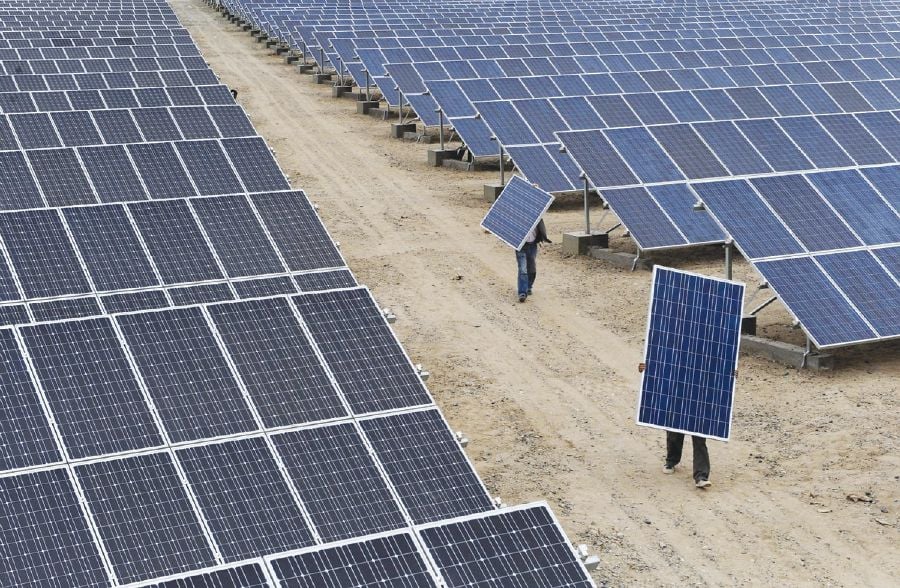Energy officials in the United States have discovered a concerning problem with gadgets that are essential to clean energy systems. These gadgets, known as inverters, aid in the connection of wind turbines and solar panels to electrical grids. They are also found in heat pumps, batteries, and electric vehicle (EV) chargers. Most of these inverters are made in China.
Alarming Discovery in Clean Energy Equipment
Experts found something strange: rogue communication equipment inside some of these inverters. These parts were not mentioned in the product documents and were discovered only after a detailed inspection. The inverters might be able to covertly connect with the outside world—possibly even with China—thanks to these concealed parts. This discovery has raised serious concerns among U.S. officials and energy experts.
While inverters are supposed to allow remote access for software updates and maintenance, utility companies usually install firewalls—digital protections—to block any direct connection with outside servers. But the newly found rogue devices, like cellular radios, could go around these protections. This means someone might control the devices from afar without being noticed.
Over the past nine months, experts also found similar hidden communication parts in batteries from several Chinese suppliers. These extra components could allow someone to switch off the devices, change their settings, or even damage the power grid by remote command. The U.S. Department of Energy (DOE) is now investigating these findings, though the government has not yet made them public.
Security Concerns with Chinese Products
The rogue parts were found by U.S. experts who take apart energy equipment to look for security issues. The exact number of inverters and batteries checked remains unknown. The experts involved have not revealed the names of the Chinese manufacturers, and they have not been allowed to speak to the media publicly.
One former U.S. intelligence official stated that China may see value in placing parts of American infrastructure at risk. The fear is that if these devices are secretly controllable, they could be turned off or misused during a time of crisis. Such actions could cause blackouts or even physical damage to energy systems.
A spokesperson from the Chinese embassy in Washington denied any wrongdoing. They said China’s work in infrastructure should not be distorted or misrepresented.
Despite the denial, experts continue to worry. Some fear that if someone remotely controls many inverters at once, it could lead to major problems. In fact, one source said it could create a built-in way to physically damage the entire power grid.
In response, some U.S. utilities are starting to move away from Chinese inverters. Florida Power & Light Company, the largest electricity provider in Florida, is reportedly trying to use alternatives that are not made in China. Meanwhile, a bill introduced in the U.S. Senate earlier this year aims to block purchases of Chinese batteries by Homeland Security from 2027 onward. The proposed law targets six major Chinese battery companies, but it has not yet been passed.
Global Impact and Reactions
The problem isn’t just in the U.S. In Europe, where clean energy use is growing fast, experts are also sounding the alarm. One German solar company, 1Komma5, has already stopped using inverters from Huawei, a major Chinese brand, due to security concerns.
Huawei is the world’s largest inverter supplier, holding 29% of global shipments in 2022. Two other Chinese companies, Sungrow and Ginlong Solis, also rank high in the global market. Despite government sanctions that forced it out of the U.S. inverter market in 2019, Huawei is still engaged in other countries.
Chinese-made inverters are connecting more than 200 gigawatts of solar power across Europe, which is equivalent to more than 200 nuclear power reactors. If someone could control even a small portion of these devices remotely, they could potentially cause widespread disruption to electricity across the continent.
Countries like Lithuania and Estonia have already taken steps to reduce the risk. A law enacted in Lithuania prohibits remote Chinese access to any battery, solar, or wind power installation that is more than 100 kW. Estonia has also raised warnings, saying the country could be vulnerable to pressure from China if they don’t limit the use of Chinese tech.
In the U.K., the government is currently reviewing how much Chinese renewable energy technology has entered its power system. That includes inverters. In one recent case, a dispute between two companies—Sol-Ark and Deye—led to Chinese-made inverters being remotely disabled, causing concern in both the U.S. and other countries.
Some inverters were reportedly shut down from China, although it’s not clear how many were affected or how badly the grid was disrupted. Requests for comment from Sol-Ark and Deye were not answered.
Security experts have pointed out that the energy industry is still behind other areas, such as telecommunications and computer chips, when it comes to reducing dependence on Chinese products. In many countries, only large energy installations are subject to strict security checks. Smaller systems like household solar panels or batteries are usually ignored—even though they now play a much larger role in modern power grids.
NATO has also issued a warning. A NATO official said China is trying to gain control over important parts of member countries’ infrastructure, including inverters. The official stressed the need to identify and reduce these “strategic dependencies.”
The discovery of these rogue devices has revealed a serious weakness in the global clean energy network—one that energy experts, governments, and power companies can no longer ignore.

